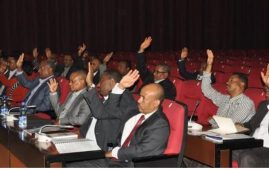(By: Merkeb Negash)
The developmental state literature puts a strong, capable and visionary leader at the center of the developmental state matrix. In addition to a strong nationalism derived by the need to catch up, the success of a developmental state project heavily depends on a strong top leader who is capable of galvanizing a nation towards a particular goal: the need to catch up with civilized societies. Both historical evidences and studies suggest that the economic miracle of East Asian states such as China has been orchastrated by a strong top leader capable of blending nationalism (Big Think), and pragmatic decisions on both the economy and politics. The former involves the need to catch up propagated through nationalist mottos such as talak neberen talakim enhonalen, Endegena, Ethiopian renaissance and so on. The latter, on the other hand, involves the mixture of strong state and the private sector economically, and a balanced use of consent and coercion politically. The late Prime Minister Meles was the typical man for the job.
Now with the death of Meles, Ethiopia as a state and the
developmental state model as a modus operandi of state political economy are at a critical juncture. Meles was the introducer and ideologue of the developmental state model not only in Ethiopia but also in Africa. Both his theoretical arguments and economic
achievements in the last several years have proved that there is, of course, another way than neoliberalism. The UNECA has recently adopted his developmental state model as a panacea for Africa’s socio-economic and political malaise. In Meles, Ethiopia and Africa have lost a great leader and ideologue. With the absence of a strong successor in Ethiopia and a strong statesman in Africa who could speak out loud the ‘dead ends’ of neoliberalism, the developmental state model seems to be in a serious danger.
The developmental state model is not a full-fledged and linear model that provides solutions for every emerging challenge. It is rather a trial and error process aimed at correcting pervasive market failures so as to achieve steady and sustainable development. This project demands a brilliant and visionary leader capable of analyzing and adapting to changing circumstances. Hence, with the loss of such a leader, the success and sustainability of the Ethiopian developmental state is at stake. In fact, Meles had put in place both the
ideological and infrastructural foundations needed for entrenching a sustainable and successful developmental state in Ethiopia. Hence, it might be argued that implementing these policies and strategies and completing the ongoing projects do not need the ‘philosopher king’ type Meles had been. The problem, however, is that the developmental state model needs to be adapted to specific and changing
circumstances. As I said above, a developmental state project is a trial and error one. We all remember the various policies and strategies Meles had come up with and later discarded. Even
implementing policies and adopting them to particular contexts need a strong, capable and visionary leader who is able to see the big picture and come up with a strategy to get there. I doubt if the new PM could manage to be such a leader in the foreseeable future. Indeed, Meles’s shoes are too big to fill.
To make matters worse, Ethiopia is found in the horn of Africa where conflicts (both domestic and interstate) are highly intertwined. With Eritrea standby to utilize every opportunity to destabilize Ethiopia, the Sudans in an unsettled tension that could lead to war anytime, Somalia still stateless and safe haven of terrorism, and, more importantly, Egypt being stabilized after revolution, the contemporary geopolitics is anything but kind to Ethiopia. Still, Ethiopia might not be blessed with a leader so pragmatic and with a diplomatic skill as Meles was. Especially Egypt poses a serious threat to the Great Renaissance Dam. Apart from its economic benefit, the Great
Renaissance Dam is so crucial in its ideological significance. Such grand projects could knit the entire nation together. In the early days of steady economic growth, the fruits of the socio-economic progress might not be fairly distributed to every citizen which in turn leads to some scepticism on the growth reports or rhetoric as some would like to call it. In such transitional period, leaders should convince their people that the future is indeed bright despite some current empirical evidences that suggest to the contrary. During such a long period of transition, The CGD report argues, citizens must forgo consumptions and rights today in return for higher standards of living tomorrow. This bargain will be accepted only if the country’s leaders communicate a credible vision of the future and a strategy for getting there. Grand nationalist projects are the typical instruments of doing so. Therefore, any threat to the GRD project would mean much more than the loss of 5000 MW electric supply. Hence, anyone that threatens the GRD project should be reminded that any threat to it would mean an active invasion and ” no one who has tried that has lived to tell the story”.
**********
The author Merkeb Negash is a guest writer on this blog. He is a lecturer at Department of Governance and Development Studies of Jimma University and can be reached at: elroenegash@ gmail.com
Check the archive for related posts.






Good job! Keep writting
Thumbs up!!